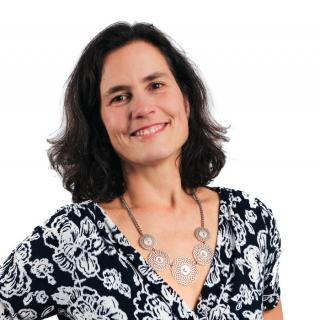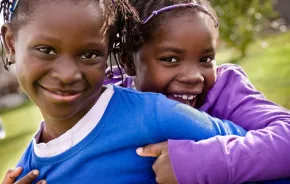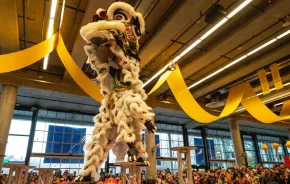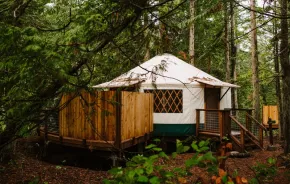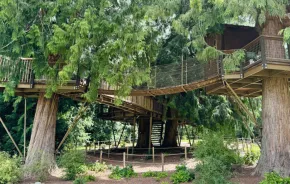
"Baby Beluga." "Shake My Sillies Out." "Bananaphone." What do these remarkably enduring kids’ songs have in common? They are among the many worldwide hits of Raffi, the Canadian singer-songwriter who is arguably North America’s most popular kids’ entertainer ever.
Starting in the 1970s, the Egyptian-born musician (his full name is Raffi Cavoukian) began recording a series of CDs under his own label, Troubador, which rocketed in popularity and sold millions. In the process, Raffi set a new standard for children’s music, both in sales and recording quality. Today, there are millions of so-called “Beluga grads” – kids who grew up listening to and loving Raffi’s music and are now eager to share his music with their own kids.
In recent years, the musician has turned his attention to other causes, including sustainability and children’s advocacy. Among other things, he founded the Center for Child Honouring on Salt Spring Island in B.C. (where he lives) and cofounded the Red Hood Project, a movement for online security for kids. He's received awards including the Order of Canada, the United Nations Earth Achievement Award, and the Queen Elizabeth II Diamond Jubilee Medal.
Raffi returned to the kids' stage in 2014, recording a new collection of orginal songs, Lovebug, which celebrate childhood themes as disparate as the banjo, hockey and chores. Hear his new album for yourself on Saturday, Jan. 31, when Raffi performs live at Seattle’s Neptune Theatre at 1 p.m. Raffi shared thoughts about his return to recording and his multivaried career in an interview with ParentMap.
 Tell us about your new album. Why the long silence?
Tell us about your new album. Why the long silence?
The album is the first in 12 year because I’ve been busy advancing the work I call "child honouring," a philosophy about developing the most peaceful and sustainable society by paying priority attention to the needs of very young. [At that time I founded the Center] I felt that I had done everything I had done everything I set out to do and even more in my childlren’s career.
But by the time 2012 came around I missed being onstage and singing. So I returned to the concert stage and in 2014 Lovebug came out. I jumped into it head first; the songs came so easily. It was great fun recording again. The title song is a fun, a toe-tapping song about love and where hugs come from.
What are some of the other highlights of the album?
There’s something for everyone. There’s a song called “Mama Loves It” all about how Mama and Papa love it when the kids help with the chores. There’s an instrumental that I dedicate to Pete Seeger called "Pete’s Banjo" — I played the guitar in open D tuning. There’s a song called “Cool Down Reggae,” [all about that] time of the day when you take a deep breath and slow down. There’s a song about hockey called "Hockey Days."
Tell us a bit about the concept of child honouring, and how that is connected to your work on ecology and the environment.
The ecology of the child is the key to addressing of the ecology of our planet; by that I mean that children need safe, clean environments in which to play and grow. They need clean air and water, all the things I wrote about in my 1980 album All I Really Need. ... When we address what children need to thrive, we of course come across the clean environments that they need so that’s why for child honouring the slogan is respecting earth and child simultaneously.
Keep in mind that children are the primary learners of humanity. The most complicated tasks of being human, such as language acquisition and speaking – children do this in the mode of play. Children are geniuses, when you think of that. They’re learning not just what they’re taught about letters but how they are treated. They’re learning how it feels to be human. That’s why It’s so important that the early years be full of respectful love for a child. You don’t want a child to feel conflicted as they grow up; you want a child full of confidence who can’t wait to give to society the joy and creativity that every person should be filled with.
 Why is music so important for kids?
Why is music so important for kids?
Music can play a great part in the emotional intelligence of a young child because what better way than to learn about the world of feelings and the world outside of us? Songs that are singable especially give children a chance to express themselves. People ask how can you get children singing and of course the answer is “How can you keep them from singing?”
What’s your dream music library for kids?
Pete Seeger comes to mind; way before me, he made the most wonderful music for children. I remember back in 1976 when I started this work I was listening to an album by the Weavers; one with Alan Arkin the actor called the Babysitters. We also have artists such as Dan Zanes, Marcy Marxer. Fred Penner. There are so many others making quality music for kids.
What was your role in changing how children’s music was produced and marketed?
In the mid-1970s if you wanted to buy children’s music you’d have to go to the back of the record store and [the CDs] would be in some little bin, a cassette or something else. There was something of a second-class nature of that way of marketing children’s music.
I came along with my Singable Songs for the Very Young in 1976 [Raffi's first CD for kids] and I thought to myself, well, children are important people and they deserve good music. So I marketed it as full list price, which in itself had an impact on changing the kids’ music because people were buying it in droves. Soon I had a gold album. Why? Because I kept saying this is a quality recording for children. It’s what they deserve.
I think that people came to understand that if you want a good album for children, music made with respect, then it’d be worth paying the same as an album for yourself.
What can fans expect from the show on Saturday?
Parents and kids can expect to hear many, many Raffi favorites, from Down by the Bay to Baby Beluga and many others. And I’ll sing a new song or two as well. There’s a lot of laughter in the show and a lot of singalong.
The adults who grew up with my music, I call them Beluga grads, bring their own kids to the show and they have a very memorable time because they remember how the songs felt in their childhood. We estimate that there are between 20 and 50 million Beluga grads; I meet them everywhere.




